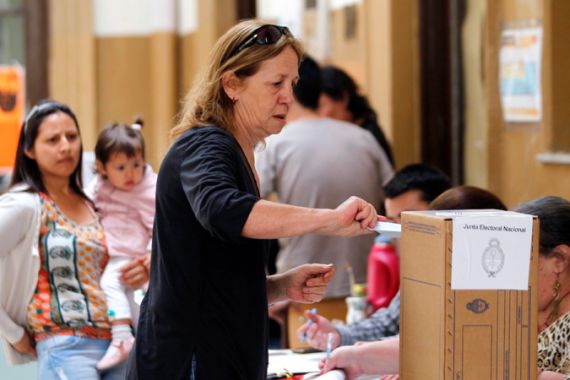Argentina opposition gains ground in vote
President Kirchner’s party loses seats in four largest districts with 72 percent of votes counted in mid-term elections.

Argentina’s ailing president has suffered a blow in mid-term elections, losing her majority in Congress and ending chances of a constitutional change to allow her a third term.
The defeat in Sunday’s elections will probably set off a contest to succeed Cristina Fernandez Kirchner in 2015.
Voters chose half of the lower house of Congress and a third of the Senate. With 72 percent of ballot boxes counted, the government said the opposition was ahead throughout the country.
“Although the Victory Front Party remains the largest single party in the country and it retains its majority in both houses of congress, it no longer will have free reign to pass legislation the way it had been doing for several years now,” Al Jazeera’s Lucia Newman reported from Buenos Aires.
Kirchner won re-election in 2011 promising to expand state control in Latin America’s third-largest economy, but her failure to tackle inflation, coupled with heavy-handed currency controls and falling central bank reserves, has dented confidence in her government.
Candidates sponsored by Sergio Massa, the opposition leader, led the House of Deputies’ contest by 43 percent to 32 percent in the key province of Buenos Aires, Florencio Randazzo, the interior minister, said, citing partial results.
Buenos Aires, the capital, is home to 40 percent of Argentina’s voters and most of the country’s agricultural output.
The loss in this strategic province was expected to trim the majority that Kirchner’s alliance has in Congress to just a few votes.
Probable contender
Massa, the mayor of the affluent Buenos Aires town of Tigre, headed his own list of candidates for Congress and is seen as a possible, business-friendly presidential contender in 2015.
“Tomorrow, we start with a new political map,” said Mauricio Macri, Buenos Aires mayor and another possible presidential candidate who promises a shift towards market-friendly policies.
Sunday’s vote also tested the support of other presidential hopefuls. Julio Cobos, a Radical Party member from Mendoza, won his race, as did Hermes Binner, a socialist from Santa Fe.
Daniel Scioli, the Buenos Aires governor who is an ally of Kirchner despite his market-friendly views, campaigned with her candidates and shared in their defeats, his position weakened.
Over the months ahead, competition among these potential presidential candidates is expected to increase with financial, grains and energy markets watching for signs of policy changes ahead.
At stake in 2015 is government policy in one of the world’s top grains exporters as it struggles to keep up with rising world food demand and attract investment needed to exploit the Vaca Muerta shale-oil and gas formation in Patagonia.
Some legislators had said they wanted a constitutional amendment to allow Kirchner to run for a third term. But the poor showing by her branch of the Peronist party in Sunday’s elections dashed those hopes once and for all.
To push through the legislation, they would need two-thirds support in both houses. If the exit polls prove accurate, Fernandez would not come close to achieving that level of support for another run for the presidency.
She was unable to campaign for her congressional candidates since an operation on October 8 to remove blood that pooled on her brain after she fell and hurt her head in August. She is expected to continue convalescing for another few weeks.